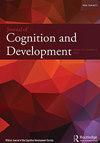Children’s Essentialist Beliefs About Weight
IF 1.6
2区 心理学
Q3 PSYCHOLOGY, DEVELOPMENTAL
引用次数: 1
Abstract
ABSTRACT Striking weight biases emerge early in development, yet cognitive-developmental research has largely ignored weight as a social characteristic of interest. How do children conceive of weight? In particular, do children hold essentialist views of weight (i.e. do they view weight as natural, stable, inductively meaningful, and reflective of people’s insides) as they do of so many other social characteristics? We conducted an exploratory investigation of children’s weight essentialism across two studies. In total, 356 participants (280 4- to 11-year-old children and 76 adults from the United States, mostly White and from middle- to high-income families) participated in three tasks, respectively assessing three dimensions of essentialism of social categories: Beliefs about weight stability, heritability, and inductive potential despite transformation. Results revealed that children viewed weight as stable (similarly so to race) and informative of someone’s food choices, but they did not view it as biologically- or genetically-determined. Thus, children may not view weight as reflecting people’s biological nature (biological essentialism), but they may view weight as reflecting people’s stable personal character (moral essentialism) – a view which is also highly compatible with weight bias, unlike biological essentialism. Children also demonstrated stronger essentialist views of lightness than heaviness across tasks, though essentialism of heaviness increased over development. Findings are discussed as they relate to early conceptions of weight and weight bias. Implications for conceptualizations and measurement of essentialism are also discussed.儿童关于体重的本质主义信念
本文章由计算机程序翻译,如有差异,请以英文原文为准。
求助全文
约1分钟内获得全文
求助全文
来源期刊

Journal of Cognition and Development
Multiple-
CiteScore
4.00
自引率
0.00%
发文量
29
期刊介绍:
The Journal of Cognition and Development is the official journal of the Cognitive Development Society (CDS). Some CDS members are concerned with basic research or theory; others focus on policy issues and practical applications. The range of interests includes cognitive development during all stages of life, and we seek to understand ontogenetic processes in both humans and nonhumans. Finally, their interests encompass typical as well as atypical development, and we attempt to characterize both biological and cultural influences on cognitive change and continuity.
 求助内容:
求助内容: 应助结果提醒方式:
应助结果提醒方式:


